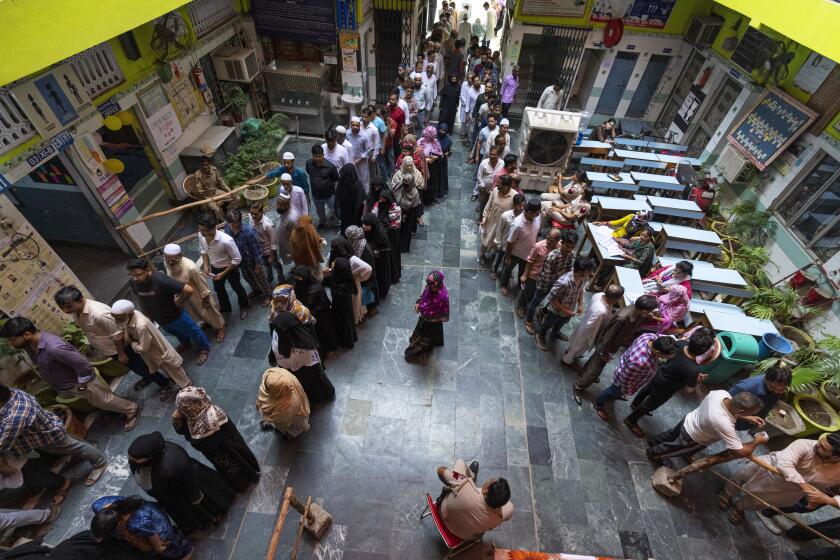Germany’s Plans to Limit Jewish Immigration Raise Ire
In the spring of 1990, with the U.S.S.R. disintegrating, thousands of Soviet Jews made an irony-laden decision: Frightened at the thought of the latent anti-Semitic forces that the Soviet breakup might unleash, they boarded trains and went, of all places, to Germany.
History-conscious American Jews might not see Germany as an obvious haven in troubled times. But the Soviet faithful perceived this country as a bastion of stability--and a new home with better work prospects than Israel.
Up until this week, their hopes have proved well-founded. For as the Soviets began to alight on the train platforms of Berlin that spring seven years ago, their passports clearly marked “Jew” in Cyrillic script, German officials decided to do the right thing: They created a new immigration category for Soviet Jews, offering full residency rights and work permits.
It was a gesture of atonement--and something more. Germany’s intellectual classes saw in these new arrivals a chance to breathe life into this country’s tiny Jewish community, what remained of the vibrant population that lived here before the Holocaust.
Berlin in the 1920s had the world’s seventh-largest Jewish population--about 125,000 people--running hundreds of clubs, newspapers, theaters and other sources of urban culture. Nearly all of it was gone by the end of World War II, and even as of 1990, only about 2,000 Jews lived in Berlin. The city’s main synagogue remained a burned-out ruin.
Wouldn’t it be nice if the Russians could help bring some of the old glories back?
And over the last seven years, that has started to happen.
The official Jewish community of Berlin has blossomed to about 10,500, thanks to the new arrivals, most of whom are from Russia and Ukraine.
Though the newcomers are overwhelmingly secular, their arrival has coincided with renewed local curiosity about, and respect for, things Jewish. Berlin’s historic main synagogue has now been restored, and the neighborhood around it has taken on an air of unparalleled Bohemian chic. Non-Jewish Berliners are eagerly enrolling their children in Hebrew classes.
Which is what makes the events of this week so surprising. Suddenly, for the first time since the Soviet Jews began arriving, politicians from the governing coalition are talking about limiting their numbers.
“The humanitarian intake of Jews can’t go on forever,” said Wolfgang Zeitlmann, a member of the German parliament from the deeply conservative Christian Social Union. “It will have to be brought to an end again.”
His remarks followed the publication in the German media of parts of a draft policy, being drawn up by his own party and the Christian Democratic Union of Chancellor Helmut Kohl, recommending restrictions on Jewish arrivals. It is due to be completed next week.
With everything seemingly going so swimmingly, what has made the political planners add Jewish immigration to their list of “problems” to be solved?
Jewish observers here think it’s Germany’s unemployment rate that is giving rise to a huge pressure for politicians to “do something.”
Talk of limiting Jewish immigration “is playing to the people who think that whatever is wrong with this country is the fault of the foreigners,” said one Jewish social worker in Berlin.
Zeitlmann has proposed working out a quota system with leading members of the Jewish community--a suggestion that has incensed the Jewish figures who would be invited to the talks. “I certainly wouldn’t hold any talks like those,” said Jewish community leader Ignatz Bubis. “I won’t speak to any government about how many Jews I think should live in Germany.”
More to Read
Start your day right
Sign up for Essential California for news, features and recommendations from the L.A. Times and beyond in your inbox six days a week.
You may occasionally receive promotional content from the Los Angeles Times.






